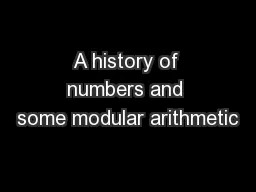PPT-Modular Refinement
Author : danika-pritchard | Published Date : 2019-11-22
Modular Refinement Arvind Computer Science amp Artificial Intelligence Lab Massachusetts Institute of Technology January 20 2011 L8 1 httpcsgcsailmiteduSNU Successive
Presentation Embed Code
Download Presentation
Download Presentation The PPT/PDF document "Modular Refinement" is the property of its rightful owner. Permission is granted to download and print the materials on this website for personal, non-commercial use only, and to display it on your personal computer provided you do not modify the materials and that you retain all copyright notices contained in the materials. By downloading content from our website, you accept the terms of this agreement.
Modular Refinement: Transcript
Download Rules Of Document
"Modular Refinement"The content belongs to its owner. You may download and print it for personal use, without modification, and keep all copyright notices. By downloading, you agree to these terms.
Related Documents














